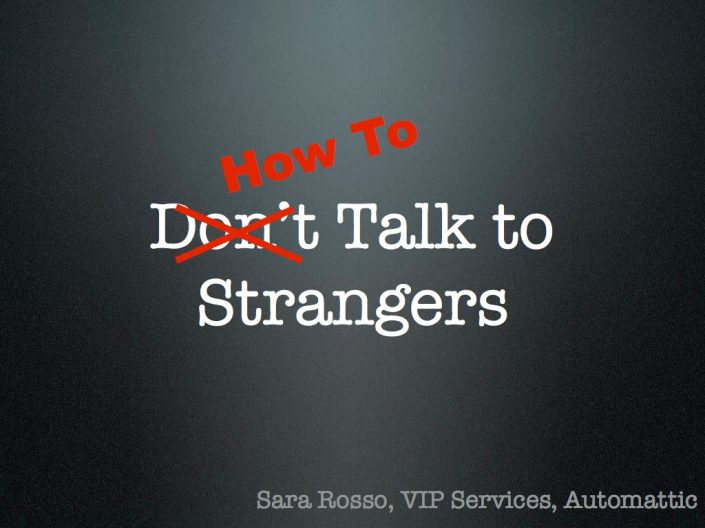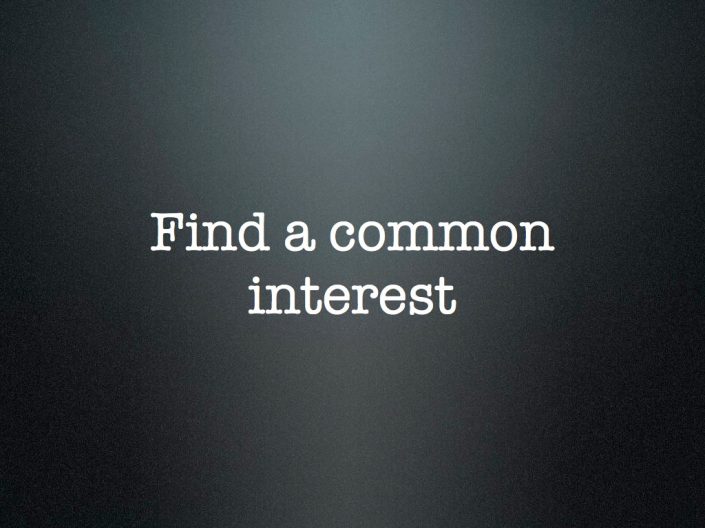I have spent a lot of time presenting about, writing about, and thinking about networking. As someone who’s uprooted their life several times (so far…I sense it will happen again in the future), I consider the ability to meet new people essential to my success and happiness. In the past I’ve even taken dares on walking up to random groups of people and chatting.
A few years ago, I presented internally in Automattic about how to talk to strangers (aka networking), and I wanted to share that presentation here and now.
Here are my tips about how to walk into a room full of people and talk to strangers:

1. Find an opening

This is either a physical or a verbal opening. When you go to an event, you’ll see these groups of people talking, in twos and threes, or larger, and to be honest, they’re not looking around for you. They’re not waiting for you to come up and talk to them. People usually won’t give you invitations to join them. So, you have to do it yourself.
If there’s a physical space, that’s even better, because you can just step into the group. I tend to do this, smile, and perhaps wait for them to notice you. You can either interrupt the conversation or not, and a lot of times I say “I’m just listening” if I don’t want to disturb the flow of conversation, and at some point you’ll get your opening.
Sometimes, you have to break in a little bit because people get used to talking to each other, and you can just say, “Hey, I just wanted to join and introduce myself.”
2. Start small
If it feels uncomfortable breaking into a group of six people, find two people talking to each other. Find one person who looks like you —hiding out in the corner perhaps, thinking “What the hell am I doing here?” and doesn’t know how to talk to anybody.
Maybe you start small with your conversation as well. Ask open-ended questions which allows people the chance to participate instead of shutting down conversation. Bad: “Have you been here before?” Yes/No. End of conversation.
3. Be a host, not a guest

This is one of my favorites: Be a host, not a guest. Even if you are a guest at any event, you can act the part of a host because you might have information about the people who are at the event, about the purpose of the event, or even about the location itself which you can present to the other person as useful. “Have you met so-and-so? I worked with him at C company on D project.” “Have you read X’s article about Y? I’m looking forward to hearing them talk about it tonight.” “Have you tried the Z here? It’s delicious.”
Use this information as a way to not be like everyone else who’s a guest, but to be someone who perhaps has a little more information and can be useful.
4. Be yourself…the interesting you
 I can’t stress this point enough. Be yourself, but the interesting you. Everyone has something special or interesting about themselves (one of my colleagues called it the “nothings” about ourselves) that someone else can appreciate. Of course, in a perfect world, you have all this time to make organic friendships, and everything’s great, and slowly you unfold like a flower or an onion, and sharing all these layers of yourself with others…but in these situations, you have to give people some help, too (the phrase “Throw me a bone” from Austin Powers comes to mind).
I can’t stress this point enough. Be yourself, but the interesting you. Everyone has something special or interesting about themselves (one of my colleagues called it the “nothings” about ourselves) that someone else can appreciate. Of course, in a perfect world, you have all this time to make organic friendships, and everything’s great, and slowly you unfold like a flower or an onion, and sharing all these layers of yourself with others…but in these situations, you have to give people some help, too (the phrase “Throw me a bone” from Austin Powers comes to mind).
You have to give people a little more information, a little more opening, for them to get a way to connect with you. So be yourself, but remember I as a stranger can’t know everything there is to know about you, even if I’m following you on Twitter. There are probably some things you can give me as openings to get to know you better.
So be yourself, but perhaps with a little more context. When you introduce yourself, you might add some context which piques the curiosity of the other person (I work in technology and I’ve published several ebooks), or perhaps is such a contrast to the event/situation you’re both in (I work in technology, but I’m also a cook and have secret dinner parties at my house) it will give the other person a great way to ask a follow-up question.
5. Find a common interest

Most people do one of these things: reading, cooking, watching television, or spend time on the Internet. One way to get to know someone is to ask them about themselves, and usually people never get tired of that. One of the questions I like to ask is “What do you in your spare time?” which can blow open the doors to a lot of interesting hobbies, pastimes, and interests. You can ask someone “What’s one site you go to every day which isn’t a social media site?” “Where do you get your news?” “Whose recommendations mean an auto-buy for you?” “What’s the last book or article you read which stayed with you for a while?”
6. Bribe

Sometimes I bring candy or chocolate with me to events or gatherings to have something to share and start a conversation with someone. Food is always a great ice breaker, and sometimes people are grateful that they didn’t have to make the first step in conversation.
7. Find a common enemy

This is not encouragement to make people your enemies for the sake of networking; rather it’s an opportunity to connect over something which can be bothering both of you, be it an article that was written, the terrible food at the event, or the wifi connectivity (and how common is this last one? Great opening to chat with someone). Sometimes something negative can be your opening, too.
8. Don’t take it personal

This is probably the most counterintuitive thing I can tell people: when it comes to meeting other people, don’t take it personally. In the end, you probably have a short amount of time to interact with people. They don’t really get to see all of who you are, and if they’re not receptive to meeting you, it may be for a lot of different reasons like they could be having a bad day. Everyone has their own individual stories and the reasons behind their mood.
If for some reason you don’t connect with someone, unless they’re incredibly rude to you, just don’t take it personally. Maybe another time, another day, you’ll get a chance to connect with them and actually become more than just strangers.
As someone who spent a lot of her life wanting everyone to like her, when I started being ok with people not liking me, it’s when I really started to enjoy networking and meeting new people. When you don’t care if someone likes you after only a brief conversation, it’s quite freeing, and it takes away a lot of the fear about being judged.
Do you have any tips to share about meeting new people?
Categories: Presentations, Productivity, Self & Finance



Great post, Sara.
I have to work on my talking to strangers skills here. I feel more comfortable doing it in the States but in Italy my Italian verbal skills are not as strong as my English, so I say nothing.
Signed,
One of your darers.
Nice article Sara… Been there, done that… More than anything it takes courage. I call it being comfortable being uncomfortable. Looking forward to another read.
-Y
Sara, I share your appreciation of communication as in your bullet-point 3, as either the perceiving or the performing party.
However, showing your people your knowledge about an event when you are not the host, but of the exact same position as they are, might cause some feeling of inadequacy of everyone who has not informed themselves in preparation. In private contexts, people might feel excluded from the collective at a party, and in business, you might simply trigger some sort of rivalry.
Obviously, this does not have to happen, especially because of how enjoyable it can be to converse with interesting, knowledgeable persons and finding out more about what they know, as well as presenting yourself to them. I still wonder, whether you do anything to prevent spoiling the mood with information you provide, other than also involving the person you are talking to.
@Laetitian – very interesting point! I think delivery (tone, facial cues, body language) is very important here – it’s not about setting yourself apart from the person you’re talking to but more of “here’s some extra information you might not know” or “I’m happy to share my information/contacts/knowledge” vs. “oh, you didn’t know?”
<> That sounds like a good aim for the sentiment that is to be delivered.
I guess taking care to make your objective known is crucial to most of that advice. That was also your text’s answer when I had initially doubted the possibility of using step one’s self-inclusion technique without intruding someone, or facing some very dismissive rejection. “I’m just listening” is a pretty good way of showing your desire to get to know someone mainly out of interest in them.
I will have to continue working on my tone and physical cues, then. Should be pretty easily combined with my efforts on presenting myself as directly as step 4 suggests. =)
Hi Sara,
I came across this previous post of yours while image searching. Good thoughts
I would extend beyond networking or business dealings to just engaging with the real people around us all the time. I think people sometimes think, “If I want to be successful, I need to network; so I’d better push myself to interact at conferences and events.” But there is so much joy, adventure and learning (not to mention unexpected “networking”) when we invest in this type of interaction with the people around us everyday.
On the plane.
Waiting to be seated at the restaurant.
Standing in line at the check-out.
During our daily commute on the train.
There are countless times in our day when we are practically elbow to elbow with the people around us — and we ignore them, like they are not even there or are an inconvenience to our space somehow. Or some may feel that they don’t want to “bother” other people. In any case, we miss interacting with the other unique people sharing the planet.
Sure, there are times when I’ve engaged with people and they have given the vibe that they aren’t in the mood to talk — or even that they think I’m up to something. But those are so few that I can’t think of a single specific time that happened (which also means the emotional “consequences” of those risks were negligible). But what I CAN tell you about is the scores of really cool interactions I’ve had with people. I’ve learned a lot I wouldn’t have known. I’ve gained perspective. I’ve passed what would otherwise have been long hours quickly. And I even made some long-term friends.
I think the “don’t talk to strangers” mentality has been burned into our collective conscience as something to do with etiquette or civility, whereas the opposite is actually true. Talking with the people around us — or at least acknowledging their presence as a real person — is the most polite (and the most inherently human) thing we can do.
For anyone who’d like more thoughts on this, by way of true stories:
https://thebestadvicesofar.wordpress.com/2015/02/14/a-marked-man
https://thebestadvicesofar.wordpress.com/2013/01/07/paradise-lost
So true. I think a large percentage of people have the potential to be fascinating and/or serve as a learning opportunity. We have to be open to meeting them, and they have to be open to sharing 🙂
This has been my biggest obstacle so far in my life. It’s why I don’t go to meetings, social gatherings and things like that. Strangers scare me. And even if I’m invited into a conversation where I won’t be intimidated for talking, I feel and become awkward because I don’t know what to talk about. I’ve read your post thoroughly and I have tried these tips in the past as well. But nothing seems to work. I guess I was born to be a digital guy (I’m not that bad in online communication with complete strangers!).
Hey, Aminul. I left you a reply, but accidentally did so in a separate post (which should be below). Just wanted to alert you that it was there.
Erik
Hey, Aminul. There is a lot I’d like to say to you about your response above! For now, I’ll give you what I hope will be a couple of new thoughts:
1. If you are unusually nervous or feel awkward talking to new people, but would still like to get better at it, believe it or not, one of the best things you can do is just admit it up front. “Hi, I’m Aminul. I’m really trying to get better at talking to people, but it still terrifies me. So bear with me, OK?” What makes anything awkward is when we know something is true, but no one is willing to talk about it. Pointing out an awkward thing actually takes about 80% of the awkwardness out of it instantly.
Don’t believe me? Let’s say you’re in an elevator full of people, when suddenly it becomes obvious that a nasty stench is spreading. This is awkward, right? But WHY? It’s because everyone knows it’s there, but no one is talking about it. And so it builds on itself, with everyone thinking, “Oh man! I hope no one thinks that was me!” But imagine that someone were to say, “Wow, that was a real stinker. Anyone else here hoping no one thinks that was you?” Really — play it out in your mind. What would happen? Most people would immediately laugh, agree, and the tension would be broken (the evil-doer might even confess).
2. A lot of the reason people have trouble thinking of what to say in new conversations is that they are trying to think of something interesting to say about THEMSELVES. You almost can’t go wrong to listen and either 1.) ASK about what someone else just said, 2.) NOTICE OUT LOUD something about another person, or 3.) REFLECT back a part of something they just said. (These are easy to do, but hard to explain in full in this forum.) People love to have positive attention, and they will have no trouble keeping the conversation going if you are attuned to them. A good communicator will also then return the favor by asking good questions about YOU.
I have written a lot on these subjects, but this isn’t the place to get into too much depth. If this is something you are really serious about, feel free to drop me a line: erik@eriktyler.com. Happy to talk further with you about specifics. Like Sara, I enjoy helping people get to “the next place” they want to go in life.
Erik